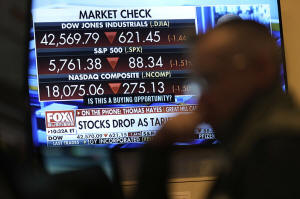If you're thinking about selling your stocks, you might want to think
twice
[March 07, 2025] By
STAN CHOE and CORA LEWIS
NEW YORK (AP) — Much like all the upheaval shaking the world, the huge
swings rocking Wall Street may feel far from normal. But, for investing
at least, all this is typical.
Sharp moves for the U.S. stock market, like its recent 6% drop in just a
couple of weeks, happen regularly. Stomaching them is the price
investors have to pay for the bigger returns that stocks can offer over
other investments in the long term.
This time doesn't look much different, experts say. Here's a glimpse at
what's behind the market's wild moves and what experts are advising
investors young and old to consider:
THE MARKET IS BAD, RIGHT?
It has certainly struggled. The stock market's main benchmark, the S&P
500, has been dropping since setting an all-time high last month,
largely because of worries about President Donald Trump's tariffs and
signals that the U.S. economy is running less powerfully than economists
expected.
Any kind of uncertainty around the economy will give Wall Street pause.
These tariffs have had a particularly jostling effect because no one
knows how long Trump will go through with them. When worries are high,
stocks sink sharply. When Wall Street goes back to thinking Trump is
using tariffs as just a negotiating tactic, stocks have bounced back,
such as on Wednesday.
STOCKS DO THIS OFTEN?
Yes. The S&P 500 has regularly seen declines bigger than this recent
one, of 10% or more, every year or so. Often, experts view them as a
culling of optimism that can otherwise run overboard, driving stock
prices too high.

Before this recent stumble, many critics were already saying the U.S.
stock market was too expensive after prices rose faster than corporate
profits. They also pointed to how only a handful of companies was
driving so much of the market's returns. A group of just seven Big Tech
companies accounted for more than half of the S&P 500's total return
last year, according to S&P Dow Jones Indices.
SHOULD I SELL AND GET OUT?
Anytime an investor sees they’re losing money, it feels bad. This recent
run feels particularly unnerving because of how incredibly calm the
market had previously been. The S&P 500 is coming off a second straight
year where it shot up by more than 20%, the first time that's happened
since baggy pants were last in style before the millennium.
Selling may offer some feeling of relief. But it also locks in losses
and prevents the chance of making the money back over time.
Historically, the S&P 500 has come back from every one of its downturns
to eventually make investors whole again. That includes after the Great
Depression, the dot-com bust and the 2020 COVID crash.
Some recoveries take longer than others, but experts often recommend not
putting money into stocks that you can't afford to lose for several
years, up to 10.
“Data has shown, historically, that no one can time the market,” said
Odysseas Papadimitriou, CEO of WalletHub. “No one can consistently
figure out the best time to buy and sell.”
Put another way: “Keep on keeping on,” suggests Chris Fasciano, vice
president, investment management and research, and chief market
strategist at Commonwealth Financial Network.
SHOULD I CHANGE ANYTHING WITH MY INVESTMENTS?
Even as the overall U.S. stock market has dropped, some corners outside
the Magnificent Seven have done much better, Fasciano said. So have
stocks outside the United States.

[to top of second column] |

Financial news is displayed as people work on the floor at the New
York Stock Exchange in New York, Tuesday, March 4, 2025. (AP
Photo/Seth Wenig)
 It could all be a reminder that
investors often do best when they have a mixed set of investments
rather than going all-in on just a few. And investors may no longer
be as diversified as they thought after years of sheer dominance by
the Magnificent Seven over the U.S. stock market and by Wall Street
over global markets.
“Now’s the time to revisit some of the old tried-and-true of
portfolio construction, like diversification,” Fasciano said.
I JUST STARTED INVESTING IN STOCKS. WHAT SHOULD I DO?
The proliferation of online trading platforms and the ease of
smartphones has helped create a new generation of investors who may
not be used to such volatility.
But the good news is younger investors often have the gift of time.
With decades to go until retirement, they can afford to ride the
waves and let their stock portfolios hopefully recover before
compounding and eventually growing even bigger.
“We would advise younger investors to not worry about this at all,”
said Phil Battin, CEO of Ambassador Wealth Management. "It’s just
background noise. If you have 30 to 50 years until you need the
money, the economy has survived world wars, oil embargoes,
presidential assassinations, Y2K, and a global pandemic. It will
survive the Trump tariffs as well.”
WHAT ABOUT CRYPTO?
This is a little trickier. “In theory, part of the appeal of crypto
is that it’s supposed to be a hedge investment that isn’t correlated
with the stock market or the fiat-currency economy,” said Sam Taube,
lead investing writer for NerdWallet.
But in reality, at least recently, crypto has often gone down in
price when stocks have gone down, instead of offering that hoped-for
protection during Wall Street's sell-offs. "So, young investors may
need to rethink the idea that crypto’s value is completely
independent of the stock market and broader economy,” Taube said.

WHAT IF I'M NEAR RETIREMENT?
Older investors have less time than younger ones to allow their
investments to bounce back. But even in retirement, some people will
need their investments to last 30 years or more, said Niladri “Neel”
Mukherjee, chief investment officer of TIAA Wealth Management.
People who have already retired may want to cut back on spending and
withdrawals after sharp market downturns, because bigger withdrawals
will remove more potential compounding ability in the future. But
even retirees, at least in the early part of retirement, should
still be invested in stocks to prepare for the possibility of
decades of spending ahead.
“You may want to slow that down and pick that back up once the
market recovers,” Mukherjee said, “but it all comes down to having
that conversation with your adviser and your portfolio manager.”
HOW LONG WILL THIS LAST?
No one knows, and don't let anyone tell you otherwise.
All contents © copyright 2025 Associated Press. All rights reserved |